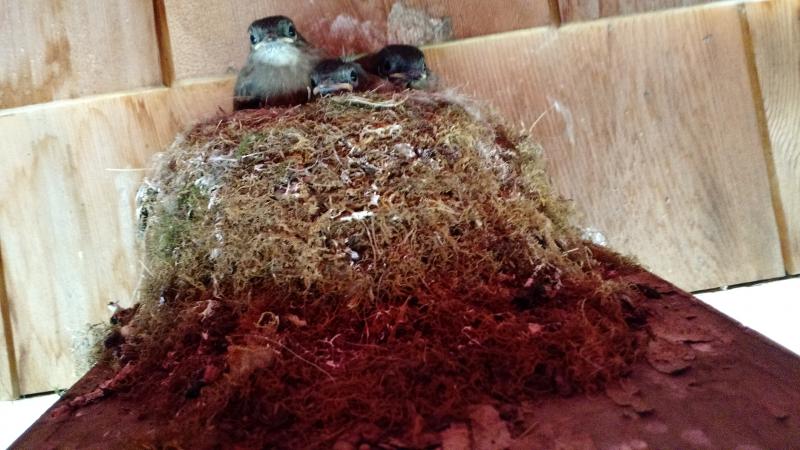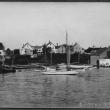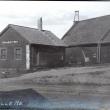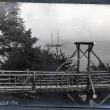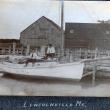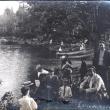This Week in Lincolnville: Got a Passion?
Everyone should have a passion. Or two or three. Something to get you out of bed in the morning with more in your head than the routine of the coming day. Something that plays in the back of your mind even as you drive to work, wash the dishes, worry over finances. Or, in my case this particular spring, even as I learn to live with the half of what was once “us.”
Where do such passions come from? Mine, one of mine, is all the stuff that’s been collected over the years and stored at the Schoolhouse Museum. More broadly, it’s the history of this town. And Lincolnville isn’t even my own hometown. I left that behind long ago at the age of 23, like stepping out of a pair of shoes that just didn’t fit me anymore. It was that easy. And then, after a few years renting on the St. George peninsula, Wally and I moved into this old farmhouse at the top of Sleepy Hollow, and well, settled in.
And I got hooked on the town’s history. Not right away. Those years were for having babies, raising them, helping parents at the end of their lives, working at all the side-hustles that kept us afloat, and not the least, being the mate of my partner through life.
But Lincolnville has a way of showing even the busiest, most distracted of us her earlier days, for instance the many, many early 20th, 19th and even 18th century houses. Check out the large outdoor map at the Jackie Young Watts Open Air Museum at the Library; it shows them all. Then there’re the cellar holes. You learn to spot them, in the woods, along the lesser-traveled roads with their old stone walls. The odd, little hummocks along Slab City, on Camden Road, on the shores of Coleman Pond are the remains of lime kilns, leftover from a once booming industry. Next time you’re in Tranquility Grange for a supper or other event, look around; imagine the room filled with farmers and their wives, little kids corralled in the anteroom during meetings, the center of town social life in the earlier years of the 20th century.
CALENDAR
MONDAY, June 26
Schoolhouse Museum Opens, 1-4 p.m., 33 Beach Road
Vacation Bible School, 5:30-8 p.m., Tranquility Grange
Selectmen meet, 6 p.m., Town Office
TUESDAY, June 27
Vacation Bible School, 5:30-8 p.m., Tranquility Grange
Lincolnville Sewer District meets, 6 p.m., LIA, 33 Beach Road
Lakes and Ponds Committee meets, 7 p.m., Town Office
WEDNESDAY, June 28
Vacation Bible School, 5:30-8 p.m., Tranquility Grange
Yoga, 6:30 p.m., Parish Hall at UCC
Planning Board meets, 7 p.m., Town Office
THURSDAY, June 29
Soup Café, noon-1p.m., Community Building, 18 Searsmont Road
Vacation Bible School, 5:30-8 p.m., Tranquility Grange
FRIDAY, June 30
Vacation Bible School, 5:30-8 p.m., Tranquility Grange
EVERY WEEK
AA meetings, Tuesdays & Fridays at 12:15 p.m., Wednesdays & Sundays at 6 p.m., United Christian Church
Lincolnville Community Library, open Tuesdays, 4-7, Wednesdays, 2-7, Fridays and Saturdays, 9 a.m.-noon. For information call 763-4343.
Soup Café, every Thursday, noon—1p.m., Community Building, Sponsored by United Christian Church. Free, though donations to the Community Building are appreciated
Schoolhouse Museum is closed for the season; call Connie Parker for a special appointment, 789-5984.
Bayshore Baptist Church, Sunday School for all ages, 9:30 a.m., Worship Service at 11 a.m., Atlantic Highway
Crossroads Community Church, 10 a.m. Sunday School, 11 a.m. Worship, meets at Lincolnville Central School
United Christian Church, Worship Service 9:30 a.m., Children’s Church during service, 18 Searsmont Road
COMING UP
July 8: Strawberry Festival
Aug. 12: New England Needle Festival
Back to the passion. On the second floor of the old Beach School, 33 Beach Road, better known around town today as the Lincolnville Improvement Association or LIA for short, is the Schoolhouse Museum. This, to borrow the term from the Smithsonian in Washington, is the town’s attic.
The place is brimming, overflowing with the memorabilia, the ephemera, the stuff of Lincolnville’s collective attics. People bring in boxes and overstuffed envelopes, albums and scrapbooks, framed photos and certificates, old tools, sometimes clothing or a quilt. The so-called “staff” of the Museum (that would be Connie Parker and I) feel swamped most of the time.
We take it all, and then sometimes look at each other and say, “what are we going to do with this?” We don’t have an inch of wall space left to hang anything, barely a surface not already covered with things. Our shelves (some years ago she and I hung shelves on the office walls, all the way up to the ceiling, and numbered them 1-26) are packed with archival boxes, many of them bulging.
A large, 5-drawer map case is stuffed full, the storage cabinet Robie Ames built for us, its six drawers and several poster-size slots above are stuffed full. Even the 55 drawers in the three storage units Harbour Mitchell got for us from UMO, when the anthropology department there was upgrading, are stuffed full.
Oh, and the town’s attic has an attic. I won’t even get into that.
It occurred to me, not long ago, that so much of the town’s history – thousands of photographs along with piles and piles of fragile handwritten letters, diaries, agreements and disagreements, receipts, account books, minutes and records of many organizations, Lincolnville’s archive – is safely tucked inside cardboard boxes which are stacked four and five high on shelves inside an unoccupied wooden building. Hmmm.
Now, there is an up side to this. Most of this material has already been catalogued and stored on our computer. Some dozen or more years ago MBNA’s Charles Cawley funded the Camden Area History Center on Union Street, and Lincolnville was included in the “area.”
We were given a couple of hand-me-down computers (which we still use), along with PastPerfect software, the best museum software for organizing a collection like ours. Once a week for several months Connie and I were trained to use this program, by a woman from the History Center.
We’d been using a rudimentary system of our own devising to number each item, but once we learned PastPerfect we took everything out and started over. Each item gets a number: LHS 2006.32.2, for example, was catalogued in 2006. It was the 32nd accession or collection we did that year, and this is the second item in that collection. The item is photographed and described, the donor of the item recorded, and best of all, its location, where we put it. Ideally the external hard drive goes home with one of us at the end of the day. If we remember.
No more nightmare scenarios (for a museum curator) when someone comes in and says: “I don’t see my grandmother’s sugar bowl. Remember, I donated it five years ago; where is it?” Well, no I don’t remember, and oh dear, where on earth did we put it?
Now we can look up the donor’s name or the grandmother’s name or “sugar bowl” and up pops the record, complete with photo and location: “Attic, shelf 9, box E.” Now all I have to do is explain why the sugar bowl isn’t out on display.
It works in reverse, too. At the back of a shelf I was sorting through the other day I found what looked a lot like a walrus tusk. Good grief, where did this come from, and why is it here? On closer inspection, though, I spotted a tiny inked number, LHS 200… Oh thank goodness, we’d accessioned it.
I went to the computer, typed in the number and there it was, a sawed off walrus tusk that had been found on a dump in the woods of Lincolnville. That doesn’t really satisfy the question of what it’s doing here, but at least it has a Lincolnville connection, mysterious though it might be.
I’m not as worried about the walrus tusks and sugar bowls in our collection as I am about the paper archive – the photos, diaries, account books, etc. But now the passion kicks in, or maybe some would say obsession. All we have to do is scan every last scrap of paper and upload it to the cloud where it can live forever, safe from mice and mold and threat of fire, where anyone in the world can view it. A few weeks ago that seemed like a fantasy, but then I went to a workshop on digitizing a historical society’s collection.
We learned how to scan to the optimal DPI, the difference between a .tiff and a .jpeg, and what exactly the cloud is, but I won’t bore you. It’s not all that complicated. Best of all, we learned there is an online repository run by the State Library where we can upload all our material, and it’s free and can accessible through our own website or Facebook page.
So now I can add a mission to the passion. After nearly a year of barely going near the place, occupied as I was with matters even closer to my heart, I’ve begun spending time every day at the Schoolhouse Museum. I’m looking in all the drawers, the corners, under tables, behind doors, finding stuff everywhere, stuff that we haven’t found room for, stuff we haven’t accessioned, stuff that has no reason to be in our collection.
This is one of the hard parts of running a museum. We rely on the donations of historic items that people bring us, but have really limited space to display or store them. Sometimes we need to say that we really don’t have room for a thing, or, what’s even harder, that it doesn’t tell us anything about our history. It’s subtle; an interesting or unusual tool, for instance, may be valuable to display, regardless of who owned it, while a simple adz has meaning because we can connect it to the Lincolnville man who used it.
We really need some help. And you don’t have to be a lifelong resident, or even have been here long at all. One of my favorite times at the LHS was when Peggy Bochkay, new to town in the early 1990s, and I joined together and created Ducktrap: Chronincles of a Maine Village. I did the writing, she the photos.
Along the way Peggy got to know dozens of people when she copied their family albums. Before long she could look at the photo of a baby or toddler and recognize the adult it would grow into. She knew the families, the roads they lived on, their homesteads. She could tell one apparently identical Cape-style house from another. She probably knew more about Lincolnville from those old photos than many natives.
So new-to-town or old-timer, young or old, even if you don’t think you have an interest in history, if you need something interesting to think about (call it passion; I do), come work with us. We have all sorts of projects that need doing, and a wonderful, musty-dusty museum to do it in. We’ll be there every Monday, Wednesday, and Friday, 1-4 p.m. Stop by or give me a call: 789-5987.
Vacation Bible School
Crossroads Community Baptist Church holds its annual week-long Vacation Bible School at Tranquility Grange this year, Monday through Friday, June 26-30, 5:30-8 p.m. This year’s program is “Maker Fun Factory, Created by God, Built for a Purpose.” All children ages 3 through 6th grade are welcome to come for crafts, play, Bible stories, snacks and music. Women’s Bible Study will be held during the same time, same place. Contact Ms. Marian, 706-6502 for more information.
Potluck at the Beach
The last Monday of the month, June 26, is the Lincolnville Neighborhood Pot Luck, 6 p.m. at Bayleaf Cottages, just before Viking Lumber on Atlantic Highway. Bring a dish to share; Jane Liedtke and her crew do the rest. Bring a guest or just yourself, a great way to meet new people. All are welcome!
Library
It’s needlework time this Tuesday, June 27 from 4 to 6 p.m. at the Lincolnville Community Library. All knitters, crocheters, quilters and others who love to do handwork are welcome!
The Library book group has chosen books to read for the next two months. First, The Signature of All Things by award-winning writer Elizabeth Gilbert. The novel tells the powerful story of Alma Whittaker, a pioneering botanist in the early 1800s who travels the world doing research on evolution. The group will meet to discuss the book on Tuesday, July 18 at 6 p.m.
Then for the August 15 meeting the group will discuss Grandma Gatewood’s Walk: The Inspiring Story of the Woman Who Saved the Appalachian Trail by Ben Montgomery. Everyone is always welcome to join the group’s discussions even if they haven’t read the current book choice.
Berry Time!
The first of Lincolnville’s two berry-themed festivals is coming up fast. Saturday July 8 the annual Strawberry Festival, held at the grounds of the United Christian Church, will once again feature a parade, strawberry shortcake and pie, children’s crafts, hot dogs, music, a puppet show, and more. Put it on your calendar!
Then, on August 12 the LIA’s Blueberry Wingding takes over McLaughlin’s Lobster Shack for the morning, serving blueberry pancakes and all the fixings, along with blueberry baked goods and a popular raffle with eight prizes.


